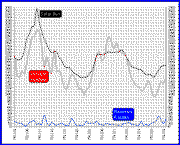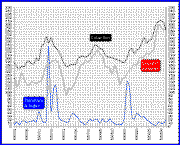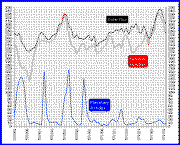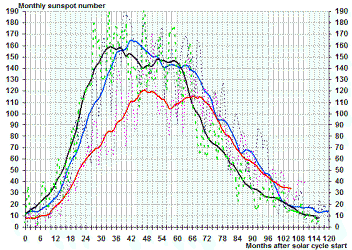|

from
BorderLands Website
Contents
Part I -
Are Hysterical Claims Really True?
by M. Theroux and James Borges
"Not since _______, have such violent outbreaks been seen
on the surface of the sun as have been reported this year."
The quote is from Harlan True Stetson,
the date in the blank is August 1917, and the year Stetson wrote
this was 1937. It sounds like it could have been written today. I'm
a little dismayed at the hysteria being generated by the media about
our current solar condition. We seem to be witnessing "grasping at
straws" attempts to point the finger at anything suspect of causing
total chaos as we approach the new millennium. At first it was Y2k
that was supposed to end the world as we know it, and as that died
out due to challenges and rational thought from real computer
experts and industrialists (note: the computer industry is preparing
for sales in the year 2000 — not the end of the world), now the Sun
is the most recent victim to blame for our upcoming Armageddon.
Mind you, most of these claims are
coming from the alternative media, who again treasure alternative
media sources for their documentation and confirmation. These media
types do not consult scientists who are respected in the fields in
which they work, rather they consult with so-called alternative
spokespersons, prophets, and pseudoscientists (yes, I said that
dreaded word) who profess "radical changes are a coming" and "head
for the hills" mentality.
A classic example of this kind of behavior was presented to us at
BSRF last year. We received several faxes from a couple of groups
who had claimed that there was an extraordinary seismic event that
occurred and had lasted for hours. They suggested that it had
originated from deep inside the earth, and was unprecedented in that
it was not felt by anyone. They had also suggested that it was
probably a precursor to other potentially devastating seismic
events. I perused the seismic databases in search of this anomaly
and found nothing, so I asked the group if they could provide any
data on the event.
I received another fax with several
seismograms from the internet's Live Seismic Server which appeared
to detail this event with a statement from the group that the USGS
was silent on the event — that they may be involved in a coverup.
After a quick glance at the seismograms it was easy to correlate the
data exactly with a known event that had occurred on the day in
question, and that their speculation on the duration of the event
had stemmed from their inability to properly interpret the
seismograms! Needless to say, after I replied to the group with the
correct analysis, it was never mentioned again.
Of course, the USGS was not involved in any coverup — they simply
had no idea what these groups were talking about and chalked it up
to more lunatic hysteria — as do many mainstream scientists when
confronted with such data. I can hardly blame them for their
reactions as this is becoming more commonplace as the millennium
approaches. Many in the scientific community are being bombarded
with allegations of covering up data and research even when they try
to present their findings openly. In order for the alternative
science community to properly liaison with mainstream science this
will have to cease. It is our hope that these attacks do not
encourage elements of quantitative science to withhold rather than
reveal.
So then, what is really happening with our Sun? Is there something
unusual and extraordinary about the recent rise in sunspot numbers?
Are communications satellites, automobiles, computers, powerplants,
etc. going to be rendered useless? Is the sun going to explode soon
or lash out with a gigantic fireball to consume the earth and her
inhabitants? It's always a possibility, but I don't think so. There
are some things that solar activity might be responsible for, but
we'll check into that a little later.
First, let's look at some graphical
comparisons of sunspot activity through recent history. It has been
stated by some media personalities that the recent rise in sunspot
numbers may be the highest ever recorded — that the jump to over 300
(or 340) is simply unexampled.
[Note: "Sunspot Number" is
comprised of a daily index of SUNSPOT activity (R), defined as R = k
(10 g + s) where S = number of individual spots, g = number of
sunspot groups, and k is a variable scaling factor (usually <1) that
indicates the combined effects of observing conditions, telescope,
and bias of the solar observers See:
http://spaceweather.com/java/archive.html#sunspotnum]
Here are some graphs to historical
solar and geomagnetic data charts from 1956-1991 which show that
unsmoothed sunspot numbers have indeed reached such levels and
higher:
Or for the really enterprising see this
historical database of daily numbers from 1818 to present (appears
to be incomplete):
http//www.oma.be/KSB-ORB/SIDC/DATA/dayssn.dat
During solar maximum there are many sunspots, and during solar
minimum there are few. The plot linked below shows the number of
smoothed sunspots observed from the year 1749 through the present:
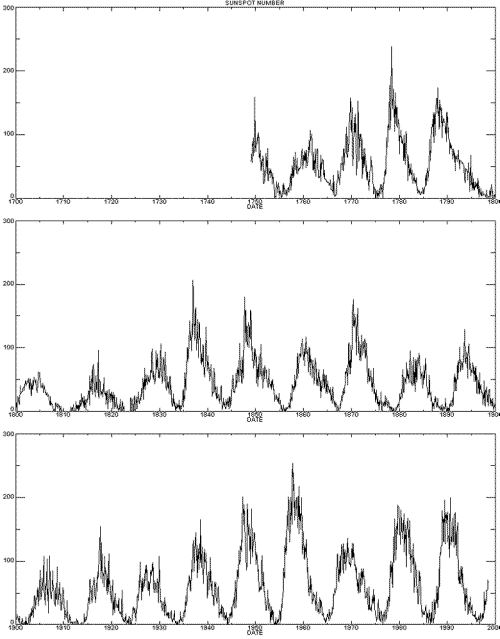
Now here is a graphical comparison of
solar cycles 21, 22 and our current Cycle 23
(image below left):
|
Cycle |
Monthly smoothed sunspot
number |
Actual monthly sunspot number
|
|
21 |
Blue
|
Dark blue
|
|
22 |
Black |
Green
|
|
23 |
Red
|
Magenta
|
And, here is a graphical comparison
(image above right) of
solar cycles 10, 13, 17, 20 and the current Cycle 23 (using the
international monthly smoothed sunspot number):
While Cycle 23 (our present cycle) has
been predicted to be slightly above average (See:
Cycle 23 will be
above average but no record setter) Dr. David Hathaway of NASA's
Marshall Space Flight Center said,
"It's like saying we're going to
have a mild or cold winter"
It is now quite probable that the Earth's climate may be linked to
sunspots. The "Little Ice Age" corresponded with a 70-year period,
1645-1715, when sunspots were thin in number, the Maunder minimum.
Also, there are strong statistical associations linking current
trends in climate (surface temperatures) to trends in solar activity.
(See these two excellent papers by Dr. Theodor Landscheidt from the
Schroeter Institute for Research in Cycles of Solar Activity, Nova
Scotia, Canada entitled,
SOLAR ACTIVITY: A DOMINANT FACTOR IN
CLIMATE DYNAMICS , and
Solar Activity Controls El Niño and La Niña).
Now that we have fairly determined that Cycle 23 is not really any
different than previous cycles, what is it that the sun will affect,
and what is it that we should really concern ourselves with?
Go Back
Part II - Sunspots and Human Behavior
by James Borges
The recent Solar Maximum gives us a wonderful opportunity to observe
the Sun in action. Borderland Sciences has been investigating the
relationship of the Sun and human behavior for many years, and we
are quite confident that we can predict behaviors based on sunspot
fluctuations over very short and long durations within the Solar
Cycle of 11 years.
Historically, research has been conducted to link
the 11 year cycle of the sun to changes in human behavior and
society. The most famous research had been done by professor A.L.
Tchijevsky, a Russian scientist, who presented a paper to the
American Meteorological Society at Philadelphia in the late 19th
century. He prepared a study of the history of mass human movement
compared to the solar cycle, beginning with the division of the
Solar cycle into four parts:
1) minimum
sunspot activity
2) increasing
sunspot activity
3) maximum
sunspot activity
4) decreasing
sunspot activity
He then divided up the agitation of mass
human movements into five phases:
1)
provoking influence of leaders upon masses
2) the "exciting" effect of
emphasized ideas upon the masses
3) the velocity of incitability due
to the presence of a single psychic center
4) the extensive areas covered by
mass movements
5) integration and individualization
of the masses
By these comparisons he constructed an
"Index of Mass Human Excitability" covering each year from 500 B.C.
to 1922 A.D. He investigated the histories of 72 countries in that
period, noting signs of human unrest such as wars, revolutions,
riots, expeditions and migrations, plus the number of humans
involved. Tchijevsky found that fully 80% of the most significant
events occurred during the years of maximum sunspot activity. He
maintained that the "exciting" period may be explained by an acute
change in the nervous and psychic character of humanity, which takes
place at sunspot maxima.
Tchijevsky discovered that the solar minimum is the lag period when
repression is tolerated by the masses, as if they lacked the vital
energy to make the needed changes. He found that during the sunspot
maximum, the movement of humans is also at its peak. Tchijevsky's
study is the foundation of sunspot theory on human behavior, and as
Harlan True Stetson, in his book
Sunspots and Their Effects, stated,
“Until, however, someone can arrive
at a more convincing excitability quotient for mass movements than
professor Tchijevsky appears yet to have done, scientists will be
reluctant to subscribe to all the conclusions which he sets forth.”
Stetson did acknowledge that the mechanism by which ultraviolet
radiation is absorbed was still a puzzle biologists had to solve.
The mechanism behind the stimulation of human behavior is still a
mystery, but the theories of Georges Lakhovsky may shed some light.
He considered his book,
The Secret of Life, the
extension of a scientific hypothesis of a new theory of life. The
Sun is one of Earth’s primary sources of cosmic radiation. While the
Sun does produce its own radiations, solar winds actually capture
passing cosmic dust and radiation and blow it into the earth’s
atmosphere. While it may seem frightening to some, this can actually
be considered the Primal Vibration that sets the cells vibrating
with Vital Force. This is the Prana, that Cosmic Breath, which is
meant to vitalize man, and is the source for our evolution.
Dr. George Crile, a distinguished American surgeon, studied the sun
in light of its radiant energy. In the ‘Preliminary Remarks’ to Lakhovsky’s
The Secret of Life, Professor d’Arsonval quotes Crile:
“It is clear that radiation produces
the electrical current which operates adaptively the organism as
a whole, producing memory, reason, imagination, emotion, the
special senses, secretions, muscular action, the response to
infection, normal growth, and the growth of benign tumours and
cancers, all of which are governed adaptively by the electric
charges that are generated by the short wave or ionizing
radiation in protoplasm.”
He felt that the entire energy system of
living beings is controlled by radiant energy and electrical forces.
D’Arsonval points out that Lakhovsky and Crile found that living
cells are electrical cells functioning as system of generators,
inductance lines, and insulators. The underlying mechanism is the
oscillating circuit. An oscillating circuit is a circuit containing
inductance and capacity, which when supplied energy from an external
source, is set in electrical vibration and oscillates at its natural
frequency. D’Arsonval explains further that a conductor is said to
possess inductance if a current flowing through it causes a magnetic
field to be set up round it. The capacity of a condenser of an
isolated body is a measure of the charge of the quantity of
electricity it is capable of storing.
From such a circuit, energy is readily
given off in the form of waves. According to Lakhovsky, the nucleus
of a living cell may be compared to an electrical oscillating
circuit. The nucleus consists of tubular filaments, chromosomes,
mitochondria, made up of insulating material and filled with a
conducting fluid containing all the mineral salts found in sea
water. These filaments are thus comparable to oscillating circuits
endowed with capacity according to a specific frequency.
The cosmic radiation from the Sun is a blessing of Vital Force. As
Lakhovsky has postulated, it is the cosmic radiations that give the
cells their vibrant oscillations. While the sunspot maxima is
occurring, the solar flares and the subsequent geo-magnetic
reactions effect the many subtle reactions that take place within
our bodies at the atomic level. It has been theorized that this has
a direct relationship to the metabolism of the body. We know it is
the subtle magnetism of positive and negative charges that pulls
certain particles across membranes in cells to produce energy. These
magnetic exchanges result in the stimulation of enzymes and the
production of energy like ATP. The increase of penetrating waves
during a solar storm causes an excitation in these electro-chemical
reactions within the body.
Tchijevsky also identified correlations
between changes in solar magnetic activity with biological
processes. In light of Lakhovsky’s theory in his own words,
“…with the aid of elementary
analogies, that the cell, essential organic unit in all living
beings, is nothing but an electromagnetic resonator, capable of
emitting and absorbing radiations of very high frequency.”
A plausible mechanism is provided to
understanding the stimulating effects the radiation from the Sun has
on human behavior. In an abstract entitled “Automated Experiment on
Macro-fluctuation Monitoring” Bruns A.V. & Visolimsky B.M. also find
a close relationship with the solar activity and bio-chemical
reactions.
“Phenomenologically obtained data
could be treated like an effect of the surface (controlled by
solar activity) on the physico-chemical kinetics. This effect
was realized, evidently through the mechanisms close to nuclear
magnetic resonance in geomagnetic field.”
In another historical study Suitbert
Ertel writes in his article “Synchronous Bursts of Activity in
Independent Cultures; Evidence for Extraterrestrial Connections”
that evidence has been reported suggesting a link between historical
oscillations of scientific creativity and solar cyclic variation.
Eddy’s discovery of abnormal secular periods of solar inactivity
(Maunders minimum type) offered the opportunity to put the present
hypothesis to a crucial test. Using time series of flourish years of
creators in science, literature, and painting (A.D. 600-1800) It was
found as expected:
1) Cultural
flourish curves show marked discontinuities (bursts) after the
onset of secular solar excursions synchronously in Europe and
China
2) During periods of extended solar
excursions, bursts of creativity in painting, literature, and
science succeeded one another with lags of about 10-15 years
3) The reported regularities of cultural
output are prominent throughout with eminent creators. They
decrease with ordinary professionals.
The hypothesized
extraterrestrial connection of human culture has thus been
strengthened. The evidence seems to show that during
the maxima of sunspot activity human behavior is stimulated.
There is some Russian research that shows an increase in cardiac
problems during sunspot maxima. The solar activity probably sets off
a preexisting condition and no one is suggesting that people will
drop dead in the streets. We could see the stress of solar activity
on the biology of living things as an evolutionary agent weeding out
the old and sick and strengthening those who can resonate with its
radiations.
In his ‘Preliminary remarks to Lakhovsky’s The Secret of Life" the Professor
d’Arsonval gives
several examples of research done in the last hundred years that
shows the most malefic effects from solar activity come at the
sunspot minima. He notes from the British Medical Journal, March 7th
& 14th of 1936 that both Colonel C.A. Gill and
Dr. Conyers Morrel
found increases in pandemics of deadly diseases during the period of
minimal sunspot activity. In Gill’s study he showed that every
pandemic of malaria since sunspot records were taken had occurred
when sunspot numbers were lowest.
Similar trends were observed in East
Africa and elsewhere with Yellow fever epidemics since 1800 occur
during the sunspot minima. Dr. Conyers Morrel also finds that,
“...waves of epidemic diseases
covering considerable periods exhibit a very close
correspondence with the phases of sunspot periods. Diphtheria,
Typhus, and Dysentery seemed to prosper when there was an
absence of solar activity.
We also see an increase in disease in Solco W. Tromp’s study. Without the stimulation from the Sun
human health seems to diminish. The immune system seems to grow
unresponsive during the solar lull and diseases can more easily
gain a foothold in the body. Not only human health but Life
itself seems hampered by the lack of solar activity.
William
Hershel wrote in 1801,
“It seems probable analyzing the period
between 1650 and 1713, and judging by the normal yields of
wheat, that a scarcity of vegetation occurred whenever the sun
appeared to be free from spots.”
The depressed state of metabolism and
lack of food in agricultural centers may have seemed very inviting
to the Mongols. Goncharov, in an abstract on the
“Asian Nomadic Invasions and Solar
Cycles”, aid, “From the 4th to the 16th centuries the Central
Asian Steppe was the cradle of the series of great nomadic
tribal invasions into agricultural regions of Europe, China, and
South Asia. Those invasions had similar features. They arose in
middle latitudes and recurred every 160-220 years – exactly
after solar abatements.”
Go Back
References:
-
Moore, Carol, Sunspot Cycles and
Activist Strategy,
http//www.kreative.net/carolmoore/sunspot-article.html
-
Lakhovsky, Georges, The Secret
of Life, BSRF, 1985
-
Petersen, William, Man, Weather,
Sun, John Anderson Publishing Company, Chicago, 1947
-
Stetson, Harlan True, Sunspots
in Action, The Ronald Press Company, New York, 1947
-
Stetson, Harlan True, Sunspots
and Their Effects, McGraw-Hill, New York, 1937
-
Botezat-Antonescu, L., Predeanu
I., “Possible Heliogeophysical Influence on Human Health in
Romania” (Abstract), Relations of Biological and
Physicochemical Processes with Solar Activity and Other
Environmental Factors, 1993
-
Breus T.K., Halberg F. and
Cornelissen G., “Effect of the Solar Activity on the
Physiological Rhythms of Human Being” (Abstract), Relations
of Biological and Physicochemical Processes with Solar
Activity and Other Environmental Factors, 1993
-
Ertel, Suitber, Solar Activity
and Bursts of Human Creativity,
http://www.knowledge.co.uk/frontiers/sf067p17.html
-
Freitas, Robert A., Sunspots and
Disease,
http://www.knowledge.co.uk/frontiers/sf034p12.html
-
Goncharov, G.G., “Asian Nomads
Invasions and Solar Cycles” (Abstract), Relations of
Biological and Physicochemical Processes with Solar Activity
and Other Environmental Factors, 1993
Go Back
|


